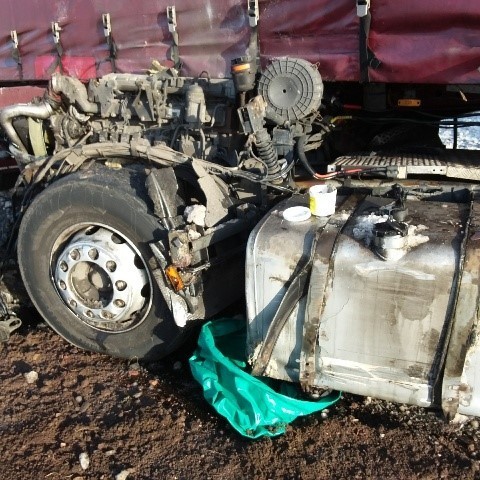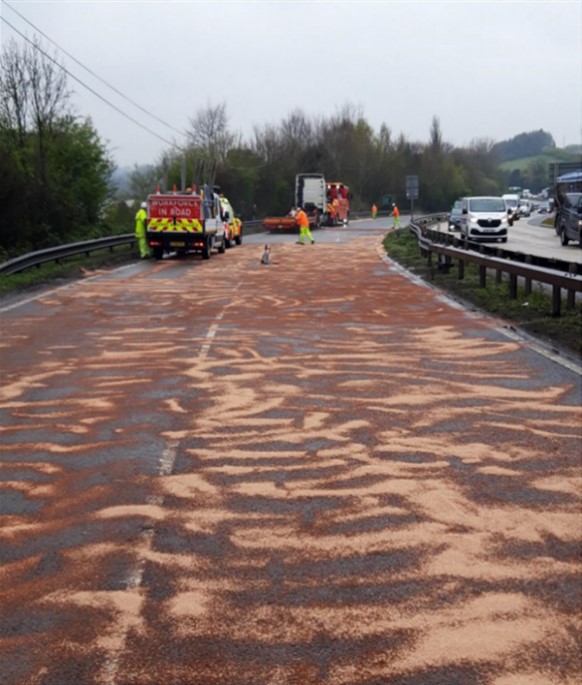Diesel spillages affect us all – they cost money to clear up, delay traffic and affect the environment.
At Highways England we’ve developed guidance for commercial vehicle drivers and operators to help stop them happening.
We recorded 314 HGV diesel spillages in 2018. Diesel left on the road surface for as little as 2 hours leads to structural damage, resulting in the need for resurfacing.
From a study of these types of incidents we found:
- 41% of incidents were estimated to be 2 hours or less
- 14% of incidents were between 2-5 hours
- 22% of incidents were over 5 hours
The cost can be around £540,000 for a 4-hour delay on a busy route.

Best practice guide
The diesel spillage best practice guide aims to help HGV drivers and operators reduce the number of incidents as well as explain the impact they have.
Highways England encourages operators and drivers to be proactive in taking steps to prevent diesel spills.
We conducted a survey of over 200 fleet operators which revealed 42% don't equip their vehicles with spill kits. This would result in a spillage not being treated until a response unit arrived.
The guide provides best practice advice on dealing with and reporting spills as well as actions to take to prevent them. It's split into two parts covering driver and operator responsibilities.
Drivers can prevent spillages
Drivers can improve safety and understanding by:
- carrying out daily walkaround checks of their vehicle to prevent spillages
- ensuring they're aware of environmental risks associated with diesel spillages
- improving their awareness of penalty notices and fines
- having an understanding of their diesel spill response plan and, where fitted, using a spill kit.
Operators also have responsibility
The guide advises operators on what they can do to prevent diesel spillages which will help the operator by:
- avoiding DVSA prohibitions (vehicle immobilisations) and other potential penalties
- not increasing insurance premiums
- reducing loss of vehicle, fuel and driver time.
There are additional safety measures available to them to prevent spillages such as:
- fitting fuel caps with anti–syphon devices and self-sealing tanks
- installing guard rails to the sides and extended cat walks on the top of the fuel tank for protection
- carrying spill kits (comprising of booms, mats, sealant putty and portable containers).
The impact and cost of a diesel spillage
We’ve also produced 'What is the impact and cost of a diesel spillage' leaflet to highlight the impact and cost of diesel spillages. This illustrates real-life case studies of spillage incidents and features costs incurred by stakeholders involved in the clean-up and repair.
Our aim is to show the importance of prevention and minimisation of diesel spillages and the costs associated with these incidents.
Focus
The focus of these documents is to improve road user knowledge and attitude, promote best practice and improve responses to diesel spillages.
We aim to achieve:
- a reduction in the number and severity of incidents
- less risk of diesel entering the water course and causing environmental damage
- less costs from resurfacing and repairs to roads
- a reduction in the number and cost of claims for Highways England to pursue and reclaim.
So, if you want to avoid diesel spillages don’t forget to read through our guides and if you want further information you can contact us at IncidentPrevention@highwaysengland.co.uk
This is a guest blog from Highways England

3 comments
Comment by Wayne posted on
Definitely operators especially should be encouraged to take this issue and drivers concerns over missing fuel caps more seriously.
Comment by Richard Cooke posted on
This article sounds a bit friendly and optional.
Given that the safety of cyclists and motor-cyclists is put as a significantly increased risk when diesel is on the road, I would have thought it would be better framed as a requirement for responsible operators.
Comment by tim britten posted on
it should be made law that a vehicle cannot start unless a fuel cap is in place. the amount of fuel you see pour out of a tank when the driver doesn't replace his fuel cap after refuelling is shocking, and would save a lot of accidents and lives.